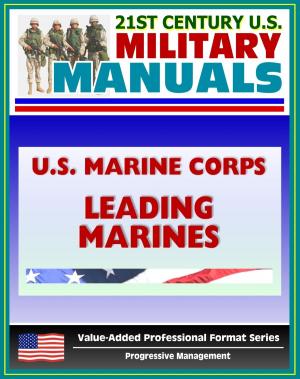21st Century FEMA Emergency Manager: An Orientation to the Position Study Course (IS-1) - Basic Emergency Management, Preparedness, Mitigation, EOC, Emergency Plans
Nonfiction, Social & Cultural Studies, Political Science, Politics, Social Services & Welfare| Author: | Progressive Management | ISBN: | 9781458180162 |
| Publisher: | Progressive Management | Publication: | June 15, 2011 |
| Imprint: | Smashwords Edition | Language: | English |
| Author: | Progressive Management |
| ISBN: | 9781458180162 |
| Publisher: | Progressive Management |
| Publication: | June 15, 2011 |
| Imprint: | Smashwords Edition |
| Language: | English |
This vital Federal Emergency Management Agency (FEMA) independent training course manual from the Emergency Management Institute (EMI) provides an introduction to Comprehensive Emergency Management (CEM) and the Integrated emergency Management System (IEMS), discussing the principles of emergency management and the role of the emergency manager. Included is an in-depth look at the four phases of comprehensive emergency management; mitigation, preparedness, response, and recovery.
Unit One: Emergency Management: Setting the Scene * Who Is the Emergency Manager? * What Is Emergency Management? * Comprehensive Emergency Management * Basic Terms * The Four Phases * Integrated Emergency Management System (IEMS) * Conclusion * Learning Check * Answers * Unit Two: Emergency Management: Understanding Your Role * The Manager as Professional * A Benchmark Study * Three Characteristics of Success * The Emergency Manager’s Responsibilities for Preparedness * A Big Challenge * Learning Check * Answers * Unit Three: Mitigation * What Is Mitigation? * Hazard Identification * Vulnerability Analysis * Your Role in Mitigation * Mitigation Strategies * Conclusion * Learning Check * Answers * Unit Four: Preparedness * What Is Preparedness? * The Emergency Operations Plan * What the Plan Is Not * Guiding Principles * The Basic Plan * Functional Annexes * Hazard-Specific Appendices * Exercising the Plan * Publicizing the Plan * Lining Up Your Resources * Inventorying Your Resources * Conclusion * Learning Check * Answers * Unit Five: Response * Stages of Response * Activating the EOC * Making the EOC Operational * Controlling Access to the EOC * Information in the EOC * Improving Public Response * Assessing Damage * Conclusion * Learning Check * Answers * Unit Six: Recovery * Recovery: The Final Phase * Recovery Assistance * Types of Federal Assistance * How to Recover * Conclusion * Learning Check * Answers * Unit Seven: Managing the Program * Daily Operations * Staffing Issues * Financial Planning * Training * Conclusion * Learning Check * Answers. Basic Principles of Emergency Management: This first unit defines emergency management. The second unit describes the tasks included in the job of emergency manager. The remaining units examine specific parts of the emergency manager’s job within the four phases of emergency management: mitigation, preparedness, response, and recovery. When you complete this course, you will have some basics to perform your job as an emergency manager. You will want to build on this baseline knowledge. This you can do through on-the-job experience and further training.
As a bonus, this compilation includes Terrorism and Other Public Health Emergencies, A Reference Guide: a comprehensive book covering all aspects of terrorism and the threats posed by biological, chemical, and radiation agents. Planning For The Unthinkable: Preparation And Response In Public Health * Biological Agents * Chemical Agents * Radiation Emergencies * Terrorism And The Food Supply * Environmental Safety And Testing * The Role Of The Federal Government * Self-Care For Media * Range Of Public Reactions * Risk Communications During A Terrorist Attack Or Other Public Health Emergency * History Of Biological, Chemical, And Radiation Emergencies * Acronyms * Selected Web Sites * Epidemiology Glossary * Descriptions of Selected Sections of Acts Related to Public Health Emergencies * Family Disaster Planning—Five Steps to Safety * Disaster Supplies Kit * Personal Workplace Disaster Supplies Kit * Self-Monitoring Checklist * Reducing Stress and Renewing Energy * Helping Children and Adolescents Cope with Violence and Disasters.
This is a privately authored news service and educational publication of Progressive Management.
This vital Federal Emergency Management Agency (FEMA) independent training course manual from the Emergency Management Institute (EMI) provides an introduction to Comprehensive Emergency Management (CEM) and the Integrated emergency Management System (IEMS), discussing the principles of emergency management and the role of the emergency manager. Included is an in-depth look at the four phases of comprehensive emergency management; mitigation, preparedness, response, and recovery.
Unit One: Emergency Management: Setting the Scene * Who Is the Emergency Manager? * What Is Emergency Management? * Comprehensive Emergency Management * Basic Terms * The Four Phases * Integrated Emergency Management System (IEMS) * Conclusion * Learning Check * Answers * Unit Two: Emergency Management: Understanding Your Role * The Manager as Professional * A Benchmark Study * Three Characteristics of Success * The Emergency Manager’s Responsibilities for Preparedness * A Big Challenge * Learning Check * Answers * Unit Three: Mitigation * What Is Mitigation? * Hazard Identification * Vulnerability Analysis * Your Role in Mitigation * Mitigation Strategies * Conclusion * Learning Check * Answers * Unit Four: Preparedness * What Is Preparedness? * The Emergency Operations Plan * What the Plan Is Not * Guiding Principles * The Basic Plan * Functional Annexes * Hazard-Specific Appendices * Exercising the Plan * Publicizing the Plan * Lining Up Your Resources * Inventorying Your Resources * Conclusion * Learning Check * Answers * Unit Five: Response * Stages of Response * Activating the EOC * Making the EOC Operational * Controlling Access to the EOC * Information in the EOC * Improving Public Response * Assessing Damage * Conclusion * Learning Check * Answers * Unit Six: Recovery * Recovery: The Final Phase * Recovery Assistance * Types of Federal Assistance * How to Recover * Conclusion * Learning Check * Answers * Unit Seven: Managing the Program * Daily Operations * Staffing Issues * Financial Planning * Training * Conclusion * Learning Check * Answers. Basic Principles of Emergency Management: This first unit defines emergency management. The second unit describes the tasks included in the job of emergency manager. The remaining units examine specific parts of the emergency manager’s job within the four phases of emergency management: mitigation, preparedness, response, and recovery. When you complete this course, you will have some basics to perform your job as an emergency manager. You will want to build on this baseline knowledge. This you can do through on-the-job experience and further training.
As a bonus, this compilation includes Terrorism and Other Public Health Emergencies, A Reference Guide: a comprehensive book covering all aspects of terrorism and the threats posed by biological, chemical, and radiation agents. Planning For The Unthinkable: Preparation And Response In Public Health * Biological Agents * Chemical Agents * Radiation Emergencies * Terrorism And The Food Supply * Environmental Safety And Testing * The Role Of The Federal Government * Self-Care For Media * Range Of Public Reactions * Risk Communications During A Terrorist Attack Or Other Public Health Emergency * History Of Biological, Chemical, And Radiation Emergencies * Acronyms * Selected Web Sites * Epidemiology Glossary * Descriptions of Selected Sections of Acts Related to Public Health Emergencies * Family Disaster Planning—Five Steps to Safety * Disaster Supplies Kit * Personal Workplace Disaster Supplies Kit * Self-Monitoring Checklist * Reducing Stress and Renewing Energy * Helping Children and Adolescents Cope with Violence and Disasters.
This is a privately authored news service and educational publication of Progressive Management.















